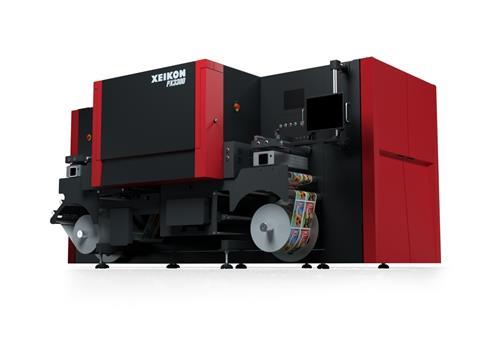
Xeikon has announced two new label presses, the Xeikon PX3300 and Xeikon PX2200, as part of an expansion of its Panther UV inkjet technology portfolio and aimed at advancing the digitisation of print manufacturing.
According to the company, the Xeikon PX2200 and PX3300 uses the company’s Panther DuraCure UV technology to produce high-gloss labels with high scruff resistance. This reportedly offers a wide colour range and long-term durability for applications including industrial, chemical, and household labels, as well as high-end labels for premium beverage and health and beauty sectors.
In addition, the company has added a new splice table, web detection capability, and cooler roller at the curing station to the new inkjet presses. This apparently makes it possible to print high-quality labels on a wider choice of substrates.
As part of the new and wider range of substrate choices, Xeikon can offer clear-on-clear facestock, which requires an opaque white to make the design stand out. Both new presses can be configured with a fifth printing station for white ink and, in addition to clear-on-clear, can print on a wide range of self-adhesive media such as coated paper, vinyl, PP, PE, PET, and metallized.
The new inkjet presses also feature the Xeikon X-800 digital front end (DFE), which provides customers with access to both machine and job data, such as ink consumption and printing times. Xeikon says that the new presses are also equipped with cloud connection and next-generation HMI, which it claims will help operators to monitor workflow, maximise productivity by avoiding downtime and bottlenecks, and make rapid changes to production lines.
The company adds that the latest generation of the X-800 DFE enables the inkjet presses to work with unique applications, such as haptic printing. For example, the inkjet presses can add an inline embellishing effect to labels using a layer of white, and further tactile elements can be added with a full colour range.
Xeikon’s new interfaces also mean that its Xeikon PX2200 and PX3300 can communicate without other equipment, such as the company’s finishing and embellishment units.
The Xeikon PX2200 is 220mm wide and is available with four or five print stations, while the Xeikon PX3300 is 330mm with the option of four or five print stations or HC-high capacity.
Both models are now commercially available in Europe and North America. A demonstration of the new inkjet presses can also be requested at Xeikon’s Global Innovation Center in Lier, Belgium, where the company transferred its operations to in 2019.
Filip Weymans, vice president of marketing at Xeikon, comments: “We are defining a pathway to full digitization of print production and manufacturing.
“Responsiveness has become key for any business and can only be achieved effectively by digitalizing all print manufacturing processes, and not just printing.”
Weymans adds that the new inkjet presses “offer great potential to maximise OEE, increase sustainability and make an operation robust for any future challenge.”
Using Xeikon’s X-800 technology, companies such as UPM Raflatac are able to print labels with short turnarounds and in high quantities via unique IDs sent directly from the cloud to Xeikon’s digital printers.
Xeikon has also developed a digital printing solution for pouches with applications including food, beverage, chemical, and pharmaceutical industries, while offering shorter lead times and enhanced brand visibility. The company’s fleXflow production line – which also uses the X800 DFE – is intended for dynamic pouch production processes.












